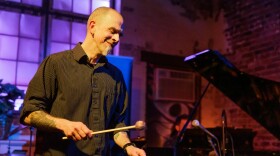This week, the world learned that Courtney Bryan is a genius — which is to say, one of 20 new recipients of a MacArthur Fellowship, colloquially known as the “genius grant.” Bryan herself has been sitting on the news, keeping it secret, while on a fellowship at the American Academy in Rome. “It made it easy that I was here, making new friends,” she reports from her studio there. “So it wasn't just going to come up in conversation.”
A composer, pianist and scholar with a far-reaching musical imagination, Bryan, 41, knows something about starting a conversation. She draws from traditions including jazz polyphony and the call-and-response of African American spirituals — musical forms rooted in dialogue. And her work has pointedly engaged with the political and social conflict of our time; she dedicated “Yet Unheard,” a powerful 2016 piece for orchestra and chorus, to the memory of Sandra Bland, whose death in a Texas jail after a traffic stop sparked widespread protest.
A previous orchestral piece, “Sanctum,” incorporated recordings of #BlackLivesMatter activists in Ferguson, MO, the police brutality survivor Marlene Pinnock, and Holiness sermons by Shirley Caesar and the Reverend C. L. Franklin.
Bryan, who was named a Composer in Residence by Opera Philadelphia last year, has been prolific as well as provocative with her output. One recent triumph was the world premiere of her “Gathering Song,” performed by the New York Philharmonic and bass-baritone Ryan Speedo Green. Reviewing that concert for the New York Times, Seth Colter Walls pronounced Bryan’s piece “thrilling in its polish and expressive range,” and drew a parallel to the music of Wayne Shorter, who had died that week at 89. “Though prismatic,” Walls added of Bryan’s piece, “it feels carefully woven as it touches on gospel and jazz traditions as well as contemporary idioms.”
That confluence has become a hallmark of Bryan’s music — a reflection of her experience, though she says it took time to fully synthesize. “Growing up in New Orleans, I was involved in all these different worlds, but separately,” she says, referring to the Anglican hymns and Gregorian chants of her church upbringing, the jazz she played in school programs, and the R&B she was arranging for marching band.

“I was doing classical over here. I was doing jazz over there. I was doing my church thing separately,” she reflects. “And so one of my big projects when I was studying at Columbia with George Lewis, and around the Columbia Jazz Study Center, was putting everything together.”
A rhetorical question once posed by Lewis, a 2002 MacArthur Fellow, directly inspired Bryan’s latest work, DREAMING (Freedom Sounds), which will have its world premiere on Nov. 1 at the Kaufman Center in New York. “It was something he mentioned in a class,” Bryan expains. “What is the sound of freedom? That question has just stuck in my head over the years.”
Bryan has explored that idea in a free-improv setting, with fellow musicians from the jazz scene in New Orleans. But she also brought it to a council of musicians in the International Contemporary Ensemble, during a series of pandemic Zoom conversations. “Then this summer I decided to revisit those conversations and write a piece for the ensemble that had the inspiration of freedom, and ended up finding different texts that I wanted to set as a libretto.”
Among them were Justice Ketanji Brown Jackson’s dissenting opinion after the Supreme Court’s affirmative action ruling this summer; Freedom Dreams, a 2003 book by Robin D.G. Kelley; and Read Until You Understand: The Profound Wisdom of Black Life and Literature, by Farah Jasmine Griffin. At the International Contemporary Ensemble premiere, the libretto will be expertly sung by two vocalists, soprano Alice Teyssier and mezzo-soprano Fay Victor.

Bryan is presently at work on her first opera, Myal, based on Erna Brodber’s historical novel of the same name. Brodber and her sister, Velma Pollard, are Jamaican writers and scholars, now in their 80s; they’re also cousins to Bryan’s father, Trevor. Two years ago, her mother, Violet Harrington Bryan, published an academic book about them titled Erna Brodber and Velma Pollard: Folklore and Culture in Jamaica. “So it’s about two women in colonial Jamaica, and it has a lot of themes that resonate with me: spirituality and freedom, and histories of slave rebellion,” Bryan says. “But I love the idea that it’s family, and me responding to my family’s work.”
As a MacArthur Fellow, she is also now part of another sort of family — one including not only mentors like George Lewis but also peers like Tyshawn Sorey, Tomeka Reid and Jason Moran. Bryan is conscious of the privilege and responsibility that comes with the honor, but also clear about the motivation guiding her work. “I try to be honest in my music,” she says. “Because there are some things that I have as an influence, and when I try it out, if it feels contrived to me, I don’t really deal with it.”
She pauses for a moment, struggling to recall a quote from the composer Alvin Singleton. “It has to do with exploring widely,” she says. “It’s like, you do all the studying, and you do all these detailed things, but also at some point you have to let go and compose intuitively.”
Copyright 2023 WRTI . To see more, visit WRTI .







